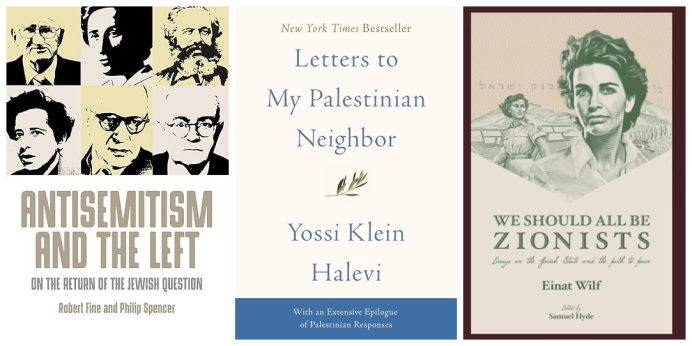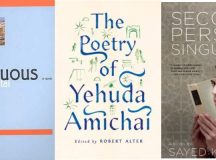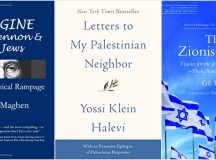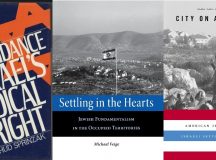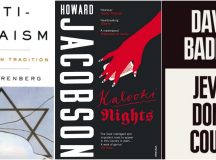Fathom is inviting experts to select their three favourite books about a subject. The series began with Sara Hirschhorn on settlements, Gil Troy on Zionism, Dave Rich on antisemitism, Liam Hoare on Israeli writers (not called Oz, Grossman or Yehoshua). Here Kathleen Hayes looks at three books to read if you are starting to look critically at ‘anti-Zionism’.
The premise of this series may seem far-fetched. Every day we see protesters cheering on the ‘resistance’ of October 7, howling for global intifada, screaming for a Free, Free Palestine ‘from the River to the Sea’—which is to say, enthusing over the slaughter of Jews and calling for more of the same. Is it possible these activists could go home, take off their keffiyehs and, in a quiet moment, wonder: What if we’re all wrong? I’m here to say Yes. I know this because for decades, I was one of such foam-flecked Israel-bashers. Unlikely as it may seem, and be, it’s possible. Reason and the rejection of hate can prevail.
If you are here, a questioning anti-Zionist, then welcome. You’ve already done the hardest part by not only opening your mind to reconsider, but reading on after confirming that you are, perhaps to your horror, on a Zionist website. I can help. The three books recommended below weren’t all part of my transition from anti-Zionist idiot to dedicated supporter of Israel, but they should help make your studies as smooth as possible. It’ll still be hard, but they should help you see the fatal flaws in ‘the right side of history’ as opposed to the side actually cognizant of history.
Robert Fine and Philip Spencer—Antisemitism and the Left: On the Return of the Jewish Question
If you’re going to question anti-Zionism, first you need to confront the historical evidence that the left—despite its insistent claims to be immune from all forms of bigotry—has always had a troubling ‘thing’ about Jews. This doesn’t mean that the left, as a broadly defined tendency, has been chockful of dyed-in-the-wool antisemites; reality is more complicated than that. Many on the left have fought, sometimes heroically, against antisemitism—but typically only when it comes in its rightwing version. Another, leftwing antisemitism exists, in which Jews are hated as the supposed enemy of progress. This is the animus driving today’s pro-Hamas festivals. Fine and Spencer do an excellent job of tracing this strain of ‘progressive’ antisemitism from the Enlightenment to the twenty-first century’s frenzied anti-Zionism.
‘What is the secular basis of Judaism?’ asked Karl Marx, son of the Enlightenment, in 1843. ‘Practical need, self-interest. What is the secular cult of the Jew? Haggling. What is his secular God? Money. Well then! Emancipation from haggling and from money, i.e. from practical, real Judaism, would be the same as the self-emancipation of our age. … The social emancipation of the Jew is the emancipation of society from Judaism.’ Marx’s successors and opponents have fiercely debated the meaning of his seminal essay ‘On the Jewish Question’, and my take on it differs, respectfully, from Fine and Spencer’s. I think it’s clear that Marx equates ‘real Judaism’ with money and usury, making it the supposed enemy of genuine emancipation. One hundred years before the birth of Israel, a strain on the left already existed that was organically hostile to Jews.
The Holocaust should have prompted deep rethinking on the left about ‘the Jewish Question’: about the Marxist movement’s universalism, their rejection of Jewish ‘particularism,’ their insistence on assimilationism and hostility to Zionism. This did not happen. Isaac Deutscher may have come closer than any other leftist when he made the remark, quoted by Fine and Spencer, that he had ‘of course, long since abandoned my anti-Zionism, which was based on a confidence in the European labour movement, or, more broadly, in European society and civilization, which that society and civilization have not justified. If, instead of arguing against Zionism in the 1920s and 1930s I had urged European Jews to go to Palestine, I might have helped to save some of the lives that were later extinguished in Hitler’s gas chambers.’ Few of today’s anti-Zionists know of this remark, with its suggestion of remorse, by a highly respected Marxist—never mind thought about its implications.
The book concludes by patiently refuting the left’s charges that Israel today engages in genocide and apartheid and threatens world peace. Behind these accusations is an impulse, with deep historical roots described in the previous pages, to identify the Jews as responsible for the world’s evils. ‘The Jewish question is not just an attitude of hostility to Jews or to those who invoke the sign of “the Jews,”’ Fine and Spencer explain, ‘but a theory designed to explain the winners and losers of capitalist society.’ By the book’s conclusion, this theory is all too familiar. ‘Antisemitism and the Left’ tacitly addresses the heatedly debated question ‘Is anti-Zionism antisemitism?’ I consider the answer a clear Yes—but if nothing else, they sure do rhyme.
Yossi Klein Halevi—Letters to My Palestinian Neighbor
Halevi begins his brilliant, exquisite collection of essays by acknowledging the seeming incongruousness of its title. He wants to directly address the Palestinian he imagines living on the hill opposite his apartment in East Jerusalem, but isn’t sure what to call this person. ‘We are living incarnations of each other’s worst historical nightmares,’ he writes. ‘Neighbors?’ Yet he can’t come up with a better word. ‘We don’t know each other, but our lives are entwined,’ he concludes. ‘And so: neighbor.’
Halevi’s book is a testament to what seems like an impossibly remote time, the year 2018. Reading it after October 7, it is impossible not to think of how many Palestinians—‘ordinary’ Palestinians, labourers, professionals, housewives—cheered Hamas’ massacres that day or actively participated in them. Today’s reader may feel, at first, that Halevi appeals, open-hearted and pure, to a humanity that’s hard to believe in.
But Halevi demonstrates that he’s clear-eyed about the obstacles and has struggled with the sense of hopelessness that unavoidably clings to this conflict. For years after the second intifada, he remarks, he felt that Israel had tried to make peace with the Oslo process and Camp David, and had been brutally rebuffed. Succumbing to fatalism then would be natural—‘But that was too easy.’ As a religious person, he was ‘forbidden to make peace with despair.’ So he resolves to tell his story to his imagined Palestinian neighbor, hoping that it might touch him, and create some understanding if not agreement.
The ten letters, or essays, weave together Jewish history and religion, the relationship between Judaism and Islam, the settlement movement and other topics, with stories drawn from his thirty-five years as an Israeli citizen. A particularly affecting story—especially for the anti-Zionist who considers IDF soldiers a soulless enemy—involves Halevi’s military service in Gaza during the first intifada. ‘That’s where I learned the meaning of occupation,’ he writes. When he saw Border Police publicly humiliate a Palestinian teenager accused of stone-throwing, he was repulsed. He ‘emerged from the first intifada convinced that Israel must end the occupation—not just for your sake, but for ours.’ Yet the question today is more acute than ever: How can this happen, and peace ever come, when the Palestinian leadership refuses to accept the Jewish state’s right to exist? Halevi’s knowledgeable, anguished, deeply humane book should make even the most strident anti-Zionist think.
Einat Wilf—We Should All Be Zionists: Essays on the Jewish State and the Path to Peace
To Einat Wilf, a former Labour Party MK, the best definition of the Israel-Palestine conflict ever came from British former Foreign Minister Ernest Bevin—no friend of the Jews or Zionism—in 1947. In an address to British Parliament, Bevin called the situation in what was then called Palestine ‘irreconcilable,’ saying the land contained two peoples, two nations—Jews and Arabs—each of whom had a central point of principle. For Jews, Bevin said, that top principle was to establish a state. For Arabs, the top principle was to prevent the Jews from establishing a state in any part of the land. As Wilf writes: ‘Notice that he is not saying that the conflict is “the Jews want a State, the Arabs want a State, and they cannot agree on the borders, and it is difficult to figure out how to divide the land.” No. He zeroes in on why the conflict is irreconcilable: the Jews want a State, and the Arabs want the Jews not to have a State. This, by definition, is irreconcilable.’
If the subsequent years have showed one thing, it’s that Bevin’s point has not been understood or accepted. The prevailing assumption of Israel and its supporters has been that the Palestinians want a state, and its only job is to work out details for that to happen. Wilf begins her fascinating collection of essays with a personal account about learning the Bevin lesson. As a young Israeli, she writes, she’d been a leftist supporter of the idea known as ‘Land for Peace.’ In the 1990s, peace had seemed within reach. All Israel had to do, the proponents of ‘Land for Peace’ believed, was give up the lands won in 1967; that was, after all, how peace had been reached with Egypt. So at Camp David with Yasser Arafat in 2000, Ehud Barak offered the Palestinians everything Israelis believed they wanted: an end to the occupation, a sovereign state, no settlements, and a capital in East Jerusalem, including holy sites.
‘What do they do?’ Wilf asks. ‘They walk away.’ And in case there’s any doubt about Palestinian thinking, eight years later, Arafat’s successor Mahmoud Abbas rejects a similar proposal by Barak’s successor Ehud Olmert. So Wilf, like many other Israelis, started asking a straightforward question, ‘What do the Palestinians want?’ She realized: ‘It turns out that the answer was staring us in the face. Palestinians told us all along what they wanted. We did not listen. Or when we did listen, we explained it away. …. They told us: “From the river to the sea, that is from the Jordan River to the Mediterranean Sea, Palestine will be free.”’
That rallying cry has become deafening in the aftermath of 7 October, and some of the most fervent longtime proponents of the two-state solution may now see it as a fairy tale. But in these three dozen essays, written between 2018 and 2022, Wilf still seems optimistic that peace is possible. The essays cover a wide swath of Zionist experience, including feminism and Zionism, the BDS movement, Israel’s nation-state law, UNRWA, Israeli Arabs, Muslim Zionists and the Abraham Accords. Several essays address the subject of her also-excellent book The War of Return: the deceptively righteous-sounding Palestinian demand for a ‘right of return’ to the homes in sovereign Israel in which their families lived before 1948—a demand that, if met, would mean the end of Israel as a Jewish state—and the West’s coddling of this fantasy. This has only contributed to the conflict continuing, seemingly forever.
Hope is now harder to come by than ever. But as Wilf writes of the Palestinians: ‘[I]f they finally adopt a path of having an Arab Palestinian State next to Israel rather than instead of Israel, they will find everyone rushing to support them in that constructive cause.’

